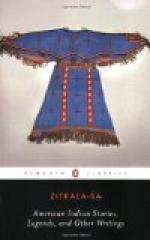Heavy hearted, Chief High Flier returned to his dwelling. Smoking his long-stemmed pipe he pondered over the case of Blue-Star Woman. The Indian’s guardian had got into a way of usurping autocratic power in disposing of the wards’ property. It was growing intolerable. “No doubt this Indian woman is entitled to allotment, but where? Certainly not here,” he thought to himself.
Laying down his pipe, he called his little granddaughter from her play, “You are my interpreter and scribe,” he said. “Bring your paper and pencil.” A letter was written in the child’s sprawling hand, and signed by the old chieftain. It read:
“My Friend:
“I make letter to you. My heart is sad. Washington give my tribe’s land to a woman called Blue-Star. We do not know her. We were not asked to give land, but our land is taken from us to give to another Indian. This is not right. Lots of little children of my tribe have no land. Why this strange woman get our land which belongs to our children? Go to Washington and ask if our treaties tell him to give our property away without asking us. Tell him I thought we made good treaties on paper, but now our children cry for food. We are too poor. We cannot give even to our own little children. Washington is very rich. Washington now owns our country. If he wants to help this poor Indian woman, Blue-Star, let him give her some of his land and his money. This is all I will say until you answer me. I shake hands with you with my heart. The Great Spirit hears my words. They are true.
“Your friend,
“Chief high flier.
“X (his mark).”
The letter was addressed to a prominent American woman. A stamp was carefully placed on the envelope.
Early the next morning, before the dew was off the grass, the chieftain’s riding pony was caught from the pasture and brought to his log house. It was saddled and bridled by a younger man, his son with whom he made his home. The old chieftain came out, carrying in one hand his long-stemmed pipe and tobacco pouch. His blanket was loosely girdled about his waist. Tightly holding the saddle horn, he placed a moccasined foot carefully into the stirrup and pulled himself up awkwardly into the saddle, muttering to himself, “Alas, I can no more leap into my saddle. I now must crawl about in my helplessness.” He was past eighty years of age, and no longer agile.
He set upon his ten-mile trip to the only post office for hundreds of miles around. In his shirt pocket, he carried the letter destined, in due season, to reach the heart of American people. His pony, grown old in service, jogged along the dusty road. Memories of other days thronged the wayside, and for the lonely rider transformed all the country. Those days were gone when the Indian youths were taught to be truthful,—to be merciful to the poor. Those days were gone when moral cleanliness was a chief virtue; when public feasts were given in honor of the virtuous girls and young men of the tribe. Untold mischief is now possible through these broken ancient laws. The younger generation were not being properly trained in the high virtues. A slowly starving race was growing mad, and the pitifully weak sold their lands for a pot of porridge.




